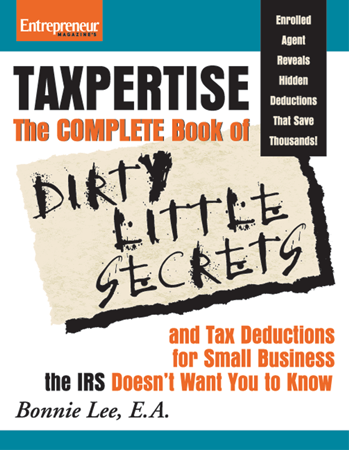As a rental property owner, you are entitled to write off “ordinary and necessary expenses for managing, conserving, or maintaining rental property from the time you make it available for rent.”
The IRS has no definitive list of deductions. As a landlord, you should visit the IRS website and take a good look at Schedule E. This is where you will report the income and expenses for your rental property. Almost every deduction, certainly the obvious ones are listed: advertising, auto and travel, cleaning and maintenance, commissions, insurance, legal and professional fees, management fees, mortgage interest, other interest, repairs, supplies, taxes, utilities, and depreciation. Beyond that are five lines for “Other Expenses,” which might include bank charges, telephone, security, equipment rental, homeowner association dues, gardening, eviction expenses, among others. Think in terms of whether or not you would have spent the money if you didn’t have the rental property. If it’s an ordinary and necessary expense, it is deductible.
Timing is everything. You can deduct your expenses as soon as the property becomes available for rent. If you own a rental property that is sitting idle and you are not looking for tenants then your expenses with the exception of depreciation, are not deductible. Perhaps you are performing a major remodel or you don’t need the money and just don’t want to deal with tenants right now or you are using the property personally then you cannot take deductions for your expenses. But if the property is available and you are attempting to secure a tenant, you may. Keep a file of your advertising and other efforts incurred to secure a tenant in the event of audit as you may be required to prove intent.
If the property is vacant and listed for sale, you may deduct the expenses until it is sold.
Here are some special rules, tips, and background on certain deductions you may consider:
1. Travel expenses: if the primary purpose of a trip is to collect rental income or to manage, conserve, or maintain your rental property, the expense is deductible. For example, if you own a condo in Hawaii and drive by to make sure it’s still there while you’re on vacation, you don’t have a bona fide deduction. Obviously, vacation was your primary purpose. But if your primary reason for traveling there is to collect back rent or paint the exterior or figure out why the roof keeps leaking, you are entitled to the deduction. Keep in mind though, that if you are visiting the property to make major capital improvements, like remodeling the bathroom and kitchen, the expense is not currently deductible. You must add the cost of the trip to the cost of the improvements and depreciate it. Make sure to keep all documentation to prove intent.
Local travel is also deductible. If you own a property 45 minutes from your home and you visit it once a month to pick up the rent and make sure the tenant hasn’t burned the place down, you should track your mileage and take a deduction.
2. Taxes: Property tax is the obvious expense listed here. However, if local ordinance requires that a landlord pay for a business license, you may deduct this expense. However, you cannot deduct charges for taxes or assessments that increase the value of your property, such as charges for putting in streets, sidewalks or water and sewer systems. You also cannot depreciate these expenditures. But they don’t disappear. You add the cost to the basis of the property. They are essentially deducted when you sell the property.
3. Points: Points, aka loan origination fees, are basically considered prepaid interest and as such are amortized over the life of the loan. You cannot write off the deduction all at one time. Take a copy of the settlement paper to your tax pro when preparing the tax return. Other deductions may be listed on that statement that may be currently deducted.
4. Repairs versus improvements: While repairs are currently deductible, improvements must be depreciated over their useful life. A repair keeps your property in good working condition. Things like unstopping a toilet, fixing rain gutters, replastering the hole in the wall left by the last tenant’s fist when you raised his rent, replacing a broken window are all examples of repairs. Improvements add value to the property and include things like remodeling the kitchen or adding a swimming pool. In 2014, new incredibly complex regulations were passed changing the parameters covering the topic of repairs versus improvements. They were so complex that the IRS disbanded with enforcement for 2014. Be sure to contact your tax pro to determine the deductible status of any repairs and improvements you perform on your property this year.
5. Tax Return Preparation Fees: A portion of the total fee you pay for tax return preparation can be allocated and deducted on Schedule E for preparation of Schedule E. Deduct tax planning/projection fees relating specifically to the rental property and any fee paid to resolve a tax underpayment issue related to your rental property on Schedule E. The full tax preparation fee is deductible on Schedule A, so why bother allocating to schedule E? Bear in mind that on Schedule A you do not benefit from the entire deduction. It is listed as a Miscellaneous itemized deduction and is reduced by 2% of your adjusted gross income.
Publication 527 is available at www.irs.gov and will provide you with complete information on the deductibility and treatment of your rental expenses.


